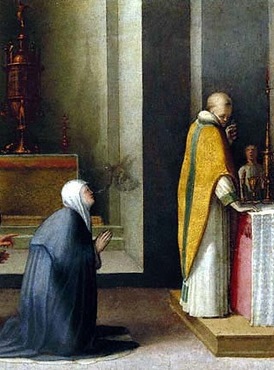
The love of God has been poured into our hearts, alleluia, by His spirit living in us, alleluia.
God of wisdom, You made Saint Catherine burn with divine love in contemplating the Lord's passion and in serving Your Church. With the help of her prayers may Your people, united in the mystery of Christ, rejoice forever in the revelation of His glory.
Ordination season is upon us. That is, you'll may be hearing of or attending episcopal, priestly and diaconal ordination ceremonies. If you get the opportunity please attend an ordination ceremony. In reading Saint Catherine of Siena's Dialogues, I thought her dialogue "The Qualities of Good Ministers in the Church" (119) as an appropriate reflection for all engaged in seminary formation at one level or another and for those already in service to the Church. Saint Catherine said:
I told you that [my ministers] have taken on the qualities of the sun. Indeed, they are suns, for there is in them no darkness of sin or ignorance, because they follow the teaching of my Truth. Nor are they lukewarm, because they are set ablaze in the furnace of my charity. They have no use for the world's honors and ranks and pleasures. Therefore, they are not afraid to correct. Those who do not hanker after power or ecclesiastical rank have no fear of losing it. They reprove [sin] courageously, for those whose conscience does not accuse them of sin have nothing to fear.
So this pearl [of justice] was not clouded over in these anointed ones, these christs of mine, of whom I have told you. [St Catherine here is referring to holy people of the past who showed themselves to be good ministers, and whose qualities are always needed in the Churcch]. No, it was luminous. They embraced voluntary poverty and sought after lowliness with deep humility. This is why they are not annoyed by people's derision or abuse or slander, or by the insult or shame or pain or torture. They were cursed, and they blessed. They endured with true patience, likely angels and more than angels -not by nature, but because of the sacramental grace given them from above to be the stewards of the body and blood to my only begotten Son.
How humbly they governed and communicated with their subjects! With what hope and lively faith! They had no fear or worry that either they or their subjects would be lacking in temporal goods, so they generously gave out the Church's possessions to the poor. Thus they fulfilled to the utmost their obligation to divide their temporal goods to meet their own needs and those of the poor and the Church. they set nothing aside, and after their death there was no great estate to settle; in fact, some of them left the Church in debt for the sake of the poor--all because of their generous charity and their trust in my providence. They were strangers to slavish fear, so they were confident they would lack nothing, either spiritually or temporally.
Because I had
appointed them to such dignity for the salvation of souls, they never rested,
good shepherds that they were, from gathering the little sheep into the
sheepfold of holy Church. In their love and hunger for souls they even laid
down their lives to rescue them from the devils' hands (cf. Jn 10). They made
themselves weak along with those who were weak. That is, to keep the weak from
being confounded with despair and to give them more room to expose their
weakness, they would slow their own weakness, saying, "I am weak along with
you." They wept with those who wept and rejoiced with those who rejoiced (cf. 1
Cor. 9:22; Rom 12:15). Thus they knew how to give everyone the right food ever
so tenderly. They encouraged the good by rejoicing in their goodness, for they
were not gnawed up with envy but broad in generosity of their neighbors and
subjects. Those who were sinful they drew out of their sin by showing that they
themselves were also sinful and weak. Their compassion was true and holy, and
while correcting others and imposing penances for the sins they had committed,
they themselves in their charity did penance along with them. Because of their
love, they who were imposing the penance suffered more than those who received
it. And sometimes some of them actually did the same penance themselves,
especially when they saw that it seemed very difficult for the penitent. And by
that act the difficulty became sweet for them.
(Sr. Mary O'Driscoll, OP, Catherine of Siena: Passion for the Truth, Compassion for Humanity, Hyde Park: New City Press, 1993).


Leave a comment